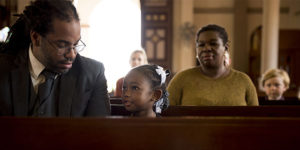
Have you ever wondered whether parenting has been getting harder with each new generation? Have you ever sat down with a grandmother, an aunty or an older mum and talked about what parenting was like when their children were young?
Of course, some aspects of parenting are always going to be hard—sleepless nights with a newborn, toddler tantrums, teenage questioning—but there are some challenges facing parents today that are completely new.
One of the biggest challenges for modern parents is the rise of technology—the screens which seem to demand our and our children’s attention 24 hours a day. We’re raising our children in a world that’s very different even from the one we ourselves grew up in! As parents, it can be very hard to guide our children through technology issues that we barely understand ourselves.
Because the internet has given us access to unlimited information, it has also made parenting more confusing. In the past, parents simply did more or less what their parents and grandparents had done before them. Parents weren’t exposed to thousands of different (and often conflicting) ideas about raising children. They didn’t feel the need to choose from a huge catalogue of trending parenting styles. In our age of information, parenting certainly has become more complicated!
Have you ever wished … ?
Have you ever wished that there was a way of sifting through the passing fads—the modern parenting advice that seems to change from year to year—to find some timeless wisdom underneath, something solid enough to build your family life on?
Have you ever wanted to explore God’s word, the Bible, to find some foundational truths and guiding principles for navigating life as a modern parent?
Have you ever longed to sit down with an older Christian mum or dad to hear the wisdom and perspective they’ve gained from years of life and parenting?
I have, many times—and with many tears. And that’s why I am so excited to be announcing the launch of our brand new podcast: Timeless Parenting, a collaboration between Growing Faith and Mothers’ Union Sydney.
Timeless Parenting is where we have real conversations across the generations exploring God’s wisdom for modern families.
The podcast is hosted by me, Harriet Connor, mum of four and Content Editor of Growing Faith and Ann Cunningham, mum to three young adults and parent educator with Mothers’ Union Sydney. We’ll be joined by a range of guests across the generations, who will share their godly wisdom on topical parenting issues. We’ll be releasing a new, 45-minute episode around the middle of every month.

In our first episode, we had a deeply encouraging conversation with Christine Jensen [pictured with us above], who blessed us with her godly perspective gained from decades and decades of raising her own family and encouraging others through her work with Mothers’ Union Sydney.
In our conversation, we considered the question, ‘Has parenting become harder?’. And then we talked about how knowing God, our heavenly Father, and belonging to his family offers just what modern parents so desperately need.
In this first episode, you’ll also find out who we are and why we’ve got together to start the Timeless Parenting podcast!
Listen to it, be encouraged and share it with your friends!
—
If you want to get in touch with us to offer some feedback or suggest a topic, you can write to us at: timelessparenting@youthworks.net
Timeless Parenting is brought to you by Growing Faith, a ministry of Youthworks Media, and Mothers’ Union Sydney.



